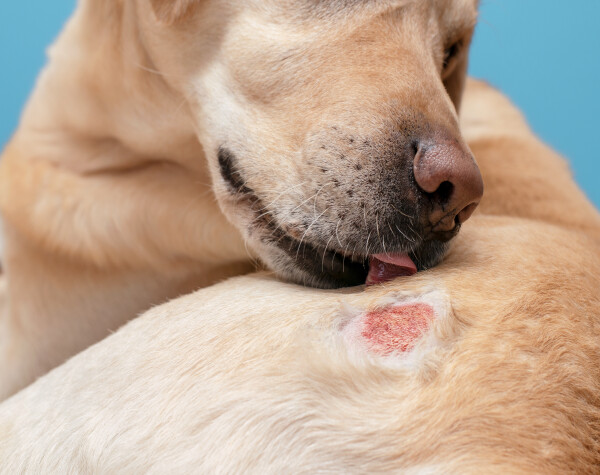Allergy Treatment
Allergies are among the most common causes of chronic skin problems in pets, leading to itching, redness, hair loss, and secondary infections. Successfully managing allergies requires a thorough understanding of the underlying triggers and a comprehensive treatment plan tailored to your pet’s unique needs. Veterinary dermatologists specialize in diagnosing and treating allergic diseases, helping pets find relief and regain a healthy, comfortable life.

What Causes Allergies in Pets?
Allergies in pets can arise from a variety of sources:
- Environmental Allergies (Atopic Dermatitis): Pets may react to airborne allergens such as pollen, dust mites, molds, and grasses. These allergens cause inflammation of the skin and intense itching.
- Food Allergies: Certain ingredients in pet food can trigger allergic reactions. Symptoms often include itching, digestive upset, and skin infections.
- Flea Allergy Dermatitis: Many pets are allergic to flea saliva, resulting in severe itching even with minimal flea exposure.
- Contact Allergies: Direct contact with chemicals, fabrics, or plants can also cause allergic reactions.
Determining the exact cause of your pet’s allergies is critical to developing an effective treatment plan.
How Are Allergies Diagnosed?
Diagnosis typically begins with a detailed history and physical examination. Veterinary dermatologists may recommend:
- Allergy Testing: Skin or blood tests can help identify specific allergens responsible for symptoms.
- Elimination Diet Trials: To diagnose food allergies, veterinarians may recommend feeding a novel or hydrolyzed protein diet for several weeks and monitoring for improvement.
- Skin Scrapings and Cytology: To rule out infections or parasites contributing to symptoms.
Because allergy symptoms overlap with other skin diseases, accurate diagnosis by a specialist is essential.
Allergy Treatment Options
Effective allergy treatment often requires a multimodal approach, combining several therapies to manage symptoms and address underlying causes.
1. Immunotherapy (Allergy Shots)
Once allergens are identified through testing, immunotherapy is the only treatment that can modify the immune response. Allergy shots gradually expose your pet to small amounts of the allergens, helping the immune system build tolerance over time.
This treatment can reduce or even eliminate symptoms in many pets and decrease the need for medications.
2. Medications to Control Symptoms
- Apoquel and Cytopoint: These newer medications target itch and inflammation quickly and with fewer side effects than traditional steroids.
- Steroids: Effective for short-term control but not ideal for long-term use due to potential side effects.
- Antihistamines: May help some pets but generally less effective than other medications.
3. Environmental Management
Reducing your pet’s exposure to known allergens can help control symptoms. This might include:
- Frequent bathing with medicated shampoos to remove allergens from the coat and skin
- Controlling dust mites and molds in the home environment
- Using air purifiers and maintaining clean bedding
4. Flea Control
Because flea allergy dermatitis is a common and severe cause of itching, strict flea control is vital. Veterinary dermatologists recommend year-round flea prevention using effective topical or oral products.
5. Nutritional Support and Supplements
Omega-3 fatty acids, probiotics, and specialized diets can support skin health and reduce inflammation. Your veterinary dermatologist can recommend supplements tailored to your pet’s needs.

Why Choose a Veterinary Dermatologist?
Veterinary dermatologists have the advanced training and experience necessary to manage complex allergic diseases. They can:
- Accurately diagnose allergies and differentiate from other skin disorders
- Develop individualized treatment plans combining medications, immunotherapy, and environmental management
- Monitor your pet’s progress and adjust treatments for optimal results
- Provide guidance on minimizing medication side effects and improving overall skin health
Working with a specialist improves your pet’s chances of long-term relief and better quality of life.
Frequently Asked Questions (FAQs)
How long does allergy treatment take to work?
Symptom control with medications like Apoquel can be rapid, often within days. Immunotherapy may take several months to show significant improvement, with optimal results usually seen after 6-12 months.
Can allergies be cured?
Allergies are chronic conditions, but immunotherapy can induce remission or significant improvement in many pets. Ongoing management may still be necessary.
Is allergy testing painful for my pet?
Skin testing involves small injections under sedation or light anesthesia, and discomfort is minimal. Blood tests are a less invasive alternative but may be less accurate.
What if my pet doesn’t respond to treatment?
Allergy management can be complex. Veterinary dermatologists will reassess the diagnosis, explore additional testing, and adjust treatment plans as needed.
Are allergy medications safe long term?
Many newer medications are safe for long-term use under veterinary supervision. Steroids are effective but not ideal for prolonged treatment due to side effects.
Conclusion
Allergic skin diseases can cause significant discomfort and frustration for pets and their owners. With the expertise of a veterinary dermatologist, your pet can receive a thorough diagnosis and a personalized allergy treatment plan designed to reduce symptoms, prevent complications, and improve quality of life.
If your pet is suffering from itching, redness, or recurrent infections, don’t hesitate to seek specialized care. Early intervention and ongoing management can make all the difference in helping your pet live comfortably.


